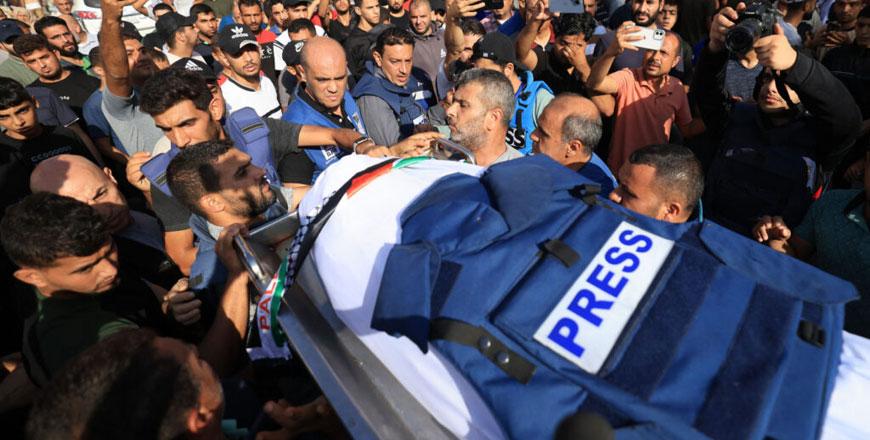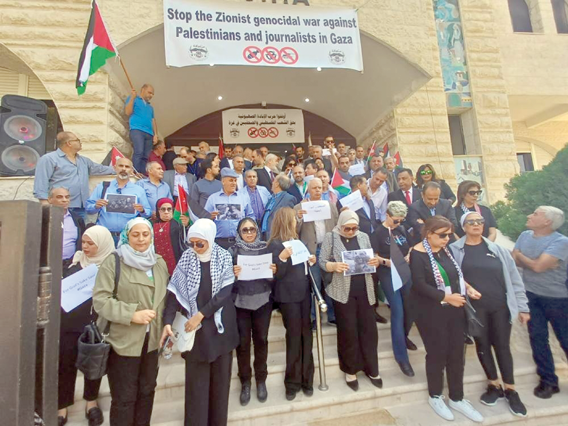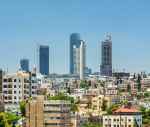You are here
With reporting in Gaza almost impossible, the Strip’s tragedy remains half told
By Mai Anati - Jul 14,2024 - Last updated at Jul 14,2024

Journalists, relatives and friends pray over the body of Palestine TV journalist Mohamed Abu Hatab and eleven family members the day after they were killed when their home was hit in the Israeli bombardment of Khan Yunis, in the southern Gaza Strip on November 3, 2023 (AFP photo)
AMMAN — In the besieged and conflict-ridden Gaza Strip, the struggle for press freedom and the right to access information remains a critical and ongoing battle for journalists. Since the early 2000s, when the political and security situation in Gaza began to intensify, journalists in Gaza have contended with a host of challenges, ranging from physical danger and political pressures to limited access to information and resources.
The long-running Israeli-Palestinian conflict subjects journalists to significant physical risks, including threats of violence, injury and even death. Many journalists have lost their lives, such as Shireen Abu Akleh, or have been severely injured, like Wael Dahdouh, while reporting on the ground, caught in the crossfire, or targeted due to their work.
Access to information is another significant barrier for journalists in Gaza. The siege imposed by Israel severely restricts movement and communication, making it challenging to obtain accurate and timely information. The lack of reliable Internet infrastructure, coupled with frequent power outages, exacerbates this issue, hindering the ability of journalists to connect with sources, verify facts, and publish their reports.
One of the profound challenges facing journalists in Gaza is the entrenched bias of Western media towards the Israeli narrative. This bias has historical roots stemming from several factors, including geopolitical alliances, historical sympathies and media ownership structures.
International organisations play a crucial role in supporting press freedom in Gaza. Organisations such as Reporters without Borders (RSF), the Committee to Protect Journalists (CPJ) and the International Federation of Journalists provide vital assistance by advocating for the rights of journalists, offering legal support and raising awareness about the challenges faced by the media in Gaza. These organisations also push for greater accountability and call on governing bodies to respect and protect press freedom. Their efforts are essential in highlighting the plight of journalists in Gaza and ensuring that the international community remains informed and engaged.
“Impunity endangers journalists not only in Palestine but also throughout the world. Those who kill journalists are attacking the public’s right to information, which is even more essential in times of conflict. They must be held accountable, and RSF will continue to work to this end, in solidarity with Gaza’s reporters,” commented RSF’s advocacy and assistance director, Antoine Bernard.
Multiple assaults, threats, cyberattacks, censorship, and killings of family members, such as the tragic experience of Wael Dahdouh, are poignant reminders of the personal and professional sacrifices made by journalists in their quest to report the truth. According to CPJ’s report, as of 7 June, about 103 journalists and media workers have been confirmed killed, 32 journalists have been reported injured, 2 journalists have been reported missing, and 44 journalists have been reported arrested.
The global community must support these efforts, advocate for their safety and rights, and work towards creating an environment where journalists can operate freely and without fear. Only then can the true stories of Gaza be told, and the principles of a free press and the right to information be upheld, and the struggle for press freedom and the right to access information in Gaza is an ongoing battle requiring persistent and coordinated efforts from local and international communities.


Related Articles
AMMAN — Minister of Government Communications Muhannad Mubaidin on Thursday offered his deepest condolences to Al Jazeera and its correspond
AMMAN — The International Federation of Journalists (IFJ) has nominated its affiliate the Palestinian Journalists Syndicate (PJS) for the UN
AMMAN — Jordan Press Association (JPA) on Wednesday organised a sit-in in front of its office in Amman to protest the Israeli aggression aga



















